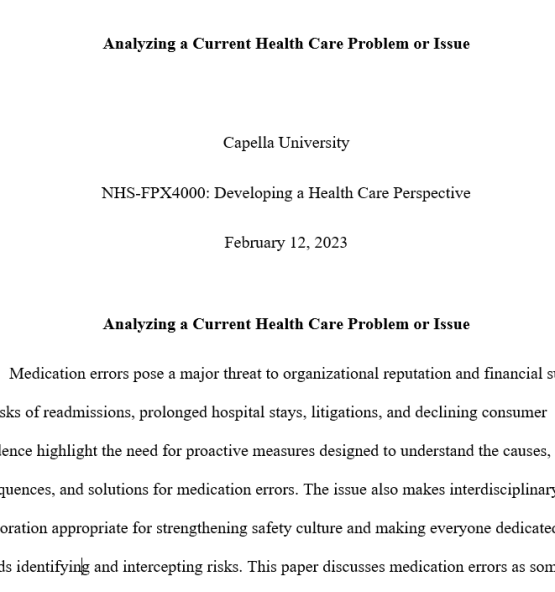
Analyzing a Current Health Care Problem or Issue
Capella University
NHS-FPX4000: Developing a Health Care Perspective
February 12, 2023
Availability:In Stock
Medication errors pose a major threat to organizational reputation and financial success. The risks of readmissions, prolonged hospital stays, litigations, and declining consumer confidence highlight the need for proactive measures designed to understand the causes, consequences, and solutions for medication errors. The issue also makes interdisciplinary collaboration appropriate for strengthening safety culture and making everyone dedicated towards identifying and intercepting risks. This paper discusses medication errors as some of the most common threats and interventions necessary to improve the quality, safety, and cost of patient care.
Medication errors are preventable scenarios common within the clinical environment. The issue involve inappropriate medication preparation and administration, which expose patients to severe complications and premature deaths. Increased frequency and severity raise questions about robustness of administrative, technical, and physical safeguards designed to enhance safety culture (Salami et al., 2019). Health leaders should initiate collaborative and well-coordinated initiatives designed to make the care team responsible and accountable for actions involving medication preparation and administration. The aim is to encourage multidisciplinary practices guided by the commitment to adhering to policies, standards, and procedures on safe medication administration (Alandajani et al., 2022).
Further, medication errors highlight the need for adequate training and education to make everyone aware of action steps, technologies, and administrative framework intended to optimize care outcomes.
An incident that involved excessive medication administration of levonphed demonstrate the need for proactive interventions for the care team to identify and intercept errors (Rahhal, 2019). The error happened at Vibra Hospital of Sacramento, leading to the patient’s death and a penalty of $75,000.
The excessive dosage overwhelmed the patient’s heart triggering investigations into the causes of the error. Findings revealed that the nurse lacked experience administering the drug and that there was inadequate oversight during the administration process. Investigations also revealed inadequate training, negligence, and system errors that led to the nurse overriding warnings. Further, no one alerted the nurse about the lapse due to the absence of a policy on a second-nurse verification to ascertain the accuracy of an order and sign on the medication before administration.
The case scenario highlights the relevance of comprehensive steps toward identifying and addressing lapses when handling high-risk medication. One primary concern was the fact that the leaders allowed a nurse with limited experience to handle the medication. The nurse was unfamiliar with the drug, which prevented her from checking a screen monitor for instructions on administering intravenous medications. The lapse revealed negligence due to the nurse’s decision to avoid checking a patient’s record to ascertain the accuracy of the prescribed order and alignment with the patient’s blood pressure. Failure to adhere to warnings is another cause of medication administration errors (Martyn et al., 2019).
The nurse overrode warnings provided by a laptop screen on the need to dilute the drug before administration. Further, the hospital’s policy required a second nurse to verify the procedures and medication and sign off on the medication. The failure to uphold the requirement is among the lapses that triggered injection of 3,000 to 8,000 times the recommended dosage of Levophed. The various causes of the medication error demonstrate the need for comprehensive efforts to enhance compliance with policies and procedures on safe medication administration.
Reviews
There are no reviews yet.